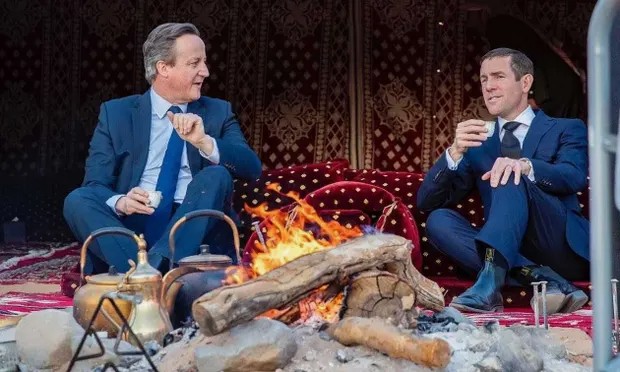It has been a dreadful few weeks for David Cameron, the former prime minister and golden boy of the Tory party. His reputation – already terribly damaged by losing the 2016 Brexit referendum and his subsequent resignation – has now sunk to depths that once would have seemed unimaginable.
After winning a majority at the 2015 election, and freed of the need for coalition partners, Whitehall civil servants remember Cameron and his chancellor, George Osborne, at their peaks, strutting around Downing Street, radiating extraordinary power and confidence.
“At that time you just couldn’t say no to them. They were completely untouchable. It was incredible to witness that total confidence. It seemed impossible to raise any doubts at all,” said one former high-ranking civil servant.
Allegations that politicians and advisers at the centre of power today may be using public positions – intentionally or unintentionally – to benefit their private interests are surfacing and being trawled over in the media. “Johnson may have made a big mistake here with this big inquiry,” said one Tory MP. “Something this big and wide is the last thing any government needs.”
The dangers for government are becoming clearer by the day. Matt Hancock, the health secretary, who met Cameron and Greensill for a drink during which they lobbied him over a potential contract, came under scrutiny over his shareholding in a family firm approved to bid for NHS contracts. He insists he has broken no rules.
Two of Johnson’s most senior advisers – his deputy chief of staff Simone Finn, and Francis Maude, who has been conducting an unremunerated review of civil service reform for the prime minister – are facing questions over whether their private financial interests are advanced by their public roles.
In recent days, other evidence of Greensill’s reach into government, and of the blurring of lines between public and private roles that the scandal has highlighted, have surfaced.
Last week it emerged that Bill Crothers, a senior official in the Cabinet Office who went on to be a Greensill director, had actually started advising Greensill while still employed as the government’s chief commercial officer – and that the arrangement had happened with the approval of the Cabinet Office.
It opened a new front in the row and prompted a snap inquiry by cabinet secretary Simon Case over how many other officials had a similar arrangement.
“This Greensill scandal is the tip of the iceberg,” the Labour leader Keir Starmer said at prime minister’s questions on Wednesday. “Dodgy contracts, privileged access, jobs for their mates. This is the return of Tory sleaze.”

Comments
No comments yet. Be the first to react!